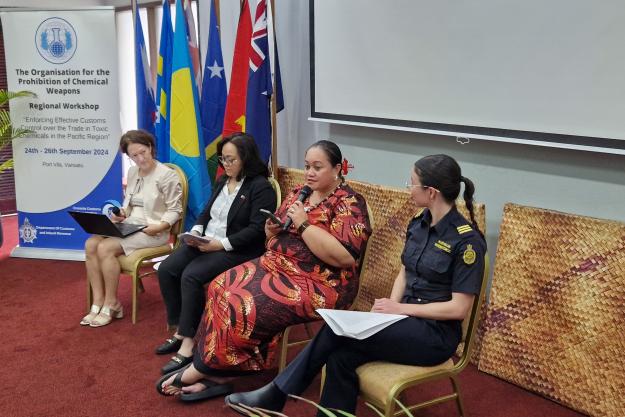The Organisation for the Prohibition of Chemical Weapons (OPCW) concluded a landmark three-day conference titled "Enforcing Effective Customs Control of the Trade in Toxic Chemicals in the Pacific Region" held from 24 to 26 September 2024 in Port Vila, Vanuatu. The event highlighted the vital role of the Chemical Weapons Convention (CWC) in enhancing border security across the Pacific region, even in areas with minimal chemical trade and industrial activities.
The Conference, first of its kind in the Pacific region, highlighted region-specific threats from the illicit trade in dual-use chemicals and the vulnerabilities associated with their transit. Participants gained a deeper understanding of the CWC's transfer regime and the challenges of monitoring scheduled chemicals, particularly for resource-limited countries. Stronger regional cooperation was recognised as key to overcoming these challenges, fostering closer multilateral collaboration between customs authorities and border forces. OPCW experts emphasised available support to enhance customs capabilities and scale up CWC-related enforcement efforts.
The Honourable Andrew Napaut, Vanuatu's Minister of Internal Affairs, opened the conference, reaffirming the significance of the CWC for regional security: "It is gratifying to note that so many Pacific Island States have recognised the importance of this Conference for the further strengthening of border security in the Pacific […] stronger borders will help prevent our territories and infrastructures from being exploited for illicit trade or transit of toxic chemicals. In addition, stronger monitoring and identification capacities among customs authorities and border forces when it comes to toxic chemicals will assist in protecting our people, environment and infrastructure from accidents and incidents involving such substances."
Key insights from the conference included:
Relevance of the CWC: Despite limited chemical trade in the Pacific region, the CWC remains crucial for safeguarding sub-regional security, particularly through monitoring chemicals passing through key trans-shipment hubs.
Strategic Trade Control Enforcement: Participants discussed the tools and resources necessary for customs and border forces to effectively monitor the transfer of scheduled chemicals, with a consensus that CWC legislation serves as an enabler for customs to implement effective control mechanisms.
Information Sharing: Delegates emphasised the need for enhanced information and intelligence sharing among customs authorities in the Pacific region to tackle challenges related to trafficking toxic chemicals and narcotics.
Capacity-Building Opportunities: Regional cooperation emerged as a critical factor in overcoming resource limitations. Several new bilateral cooperation initiatives were launched, including in areas such as sampling, forensics, and laboratory support.
The conference inspired new partnerships and promoted closer collaboration between national stakeholders, technical experts, and multilateral organisations. Participants agreed that continued and deepened CWC-focused customs activities are essential for the region, with opportunities for analytical and equipment support to be further explored.
"UNODA considers this OPCW-led event in Vanuatu an excellent opportunity to engage in practical dialogue with customs officials and international assistance providers to further strengthen strategic trade management over chemical items of dual use concern in the Pacific region. We value the close cooperation with OPCW regarding the UNSCR 1540 provisions aimed at preventing the proliferation of WMDs to and by non-State actors," said Amanda Cowl, UNODA's Coordinator in Asia-Pacific for UNSCR 1540 implementation.

Participants at the OPCW conference held in Port Vila, Vanuatu, from 24 to 26 September 2024
Photo: OPCW
Twenty-eight participants from 16 OPCW Member States, including representatives from 13 Pacific Island States, attended the event. Experts from various partner organisations enriched the discussions with their technical expertise, offering complementary perspectives on the implementation of the CWC and the monitoring of toxic chemicals in the region.
The OPCW remains committed to supporting Pacific Island States in building stronger customs control capacities and enhancing regional security in line with the goals of the Chemical Weapons Convention.
Background
As the implementing body for the Chemical Weapons Convention, the OPCW, with its 193 Member States, oversees the global endeavour to permanently eliminate chemical weapons. Since the Convention's entry into force in 1997, it is the most successful disarmament treaty eliminating an entire class of weapons of mass destruction.
In 2023, the OPCW verified that all chemical weapons stockpiles declared by the 193 States Parties to the Chemical Weapons Convention since 1997 - totalling 72,304 metric tonnes of chemical agents - have been irreversibly destroyed under the OPCW's strict verification regime.
For its extensive efforts in eliminating chemical weapons, the OPCW received the 2013 Nobel Peace Prize.






